The Legacy Effect in the Prevention of Cardiovascular Disease
- PMID: 33105611
- PMCID: PMC7690390
- DOI: 10.3390/nu12113227
The Legacy Effect in the Prevention of Cardiovascular Disease
Abstract
The "legacy effect" describes the long-term benefits that may persist for many years after the end of an intervention period, involving different biological processes. The legacy effect in cardiovascular disease (CVD) prevention has been evaluated by a limited number of studies, mostly based on pharmacological interventions, while few manuscripts on dietary interventions have been published. Most of these studies are focused on intensive treatment regimens, whose main goal is to achieve tight control of one or more cardiovascular risk factors. This review aims to summarise the legacy effect-related results obtained in those studies and to determine the existence of this effect in CVD prevention. There is sufficient data to suggest the existence of a legacy effect after intensive intervention on cardiovascular risk factors; however, this effect is not equivalent for all risk factors and could be influenced by patient characteristics, disease duration, and the type of intervention performed. Currently, available evidence suggests that the legacy effect is greater in subjects with moderately-high cardiovascular risk but without CVD, especially in those patients with recent-onset diabetes. However, preventive treatment for CVD should not be discontinued in high-risk subjects, as the level of existing evidence on the legacy effect is low to moderate.
Keywords: cardiovascular disease; diabetes; diet; dyslipidaemia; hypertension; legacy effect; metabolic memory.
Conflict of interest statement
The authors declare no conflict of interest.
Figures

Similar articles
-
Long-term mortality after blood pressure-lowering and lipid-lowering treatment in patients with hypertension in the Anglo-Scandinavian Cardiac Outcomes Trial (ASCOT) Legacy study: 16-year follow-up results of a randomised factorial trial.Lancet. 2018 Sep 29;392(10153):1127-1137. doi: 10.1016/S0140-6736(18)31776-8. Epub 2018 Aug 26. Lancet. 2018. PMID: 30158072 Clinical Trial.
-
Suboptimal control of lipid levels: results from the non-interventional Centralized Pan-Russian Survey of the Undertreatment of Hypercholesterolemia II (CEPHEUS II).Cardiovasc Diabetol. 2017 Dec 16;16(1):158. doi: 10.1186/s12933-017-0641-4. Cardiovasc Diabetol. 2017. PMID: 29246151 Free PMC article.
-
Awareness, treatment, and control of major cardiovascular risk factors in a small-scale Italian community: results of a screening campaign.Vasc Health Risk Manag. 2013;9:177-85. doi: 10.2147/VHRM.S40925. Epub 2013 Apr 30. Vasc Health Risk Manag. 2013. PMID: 23662063 Free PMC article.
-
Legacy Effect of Intensive Blood Glucose Control on Cardiovascular Outcomes in Patients With Type 2 Diabetes and Very High Risk or Secondary Prevention of Cardiovascular Disease: A Meta-analysis of Randomized Controlled Trials.Clin Ther. 2018 May;40(5):776-788.e3. doi: 10.1016/j.clinthera.2018.03.015. Epub 2018 Apr 12. Clin Ther. 2018. PMID: 29656857 Review.
-
Combined antihypertensive and lipid-lowering treatment.Curr Hypertens Rep. 2004 Aug;6(4):300-6. doi: 10.1007/s11906-004-0025-5. Curr Hypertens Rep. 2004. PMID: 15257865 Review.
Cited by
-
Acute effect of proprotein convertase subtilisin/kexin type 9 inhibitor on oxidized low-density lipoprotein and lipid profile in patients at cardiovascular risk.J Clin Biochem Nutr. 2023 Nov;73(3):249-254. doi: 10.3164/jcbn.23-45. Epub 2023 Sep 1. J Clin Biochem Nutr. 2023. PMID: 37970546 Free PMC article.
-
Influence of early use of sodium-glucose transport protein 2 inhibitors, glucagon-like peptide-1 receptor agonists and dipeptidyl peptidase-4 inhibitors on the legacy effect of hyperglycemia.Front Endocrinol (Lausanne). 2024 May 13;15:1369908. doi: 10.3389/fendo.2024.1369908. eCollection 2024. Front Endocrinol (Lausanne). 2024. PMID: 38803473 Free PMC article.
-
Longitudinal Adherence to Diabetes Quality Indicators and Cardiac Disease: A Nationwide Population-Based Historical Cohort Study of Patients With Pharmacologically Treated Diabetes.J Am Heart Assoc. 2022 Oct 4;11(19):e025603. doi: 10.1161/JAHA.122.025603. Epub 2022 Sep 21. J Am Heart Assoc. 2022. PMID: 36129044 Free PMC article.
-
Reducing outpatient wait times through telemedicine: a systematic review and quantitative analysis.BMJ Open. 2025 Jan 30;15(1):e088153. doi: 10.1136/bmjopen-2024-088153. BMJ Open. 2025. PMID: 39884707 Free PMC article.
-
Kidney outcomes are altered by preconception weight modulation in rodent mothers with obesity.Sci Rep. 2024 Jul 29;14(1):17363. doi: 10.1038/s41598-024-68234-9. Sci Rep. 2024. PMID: 39075112 Free PMC article.
References
-
- Institute of Medicine (IOM) Promoting Cardiovascular Health in the Developing World: A Critical Challenge to Achieve Global Health. The National Academies Press; Washington, DC, USA: 2010. pp. 19–20. - PubMed
Publication types
MeSH terms
Substances
Grants and funding
LinkOut - more resources
Full Text Sources

